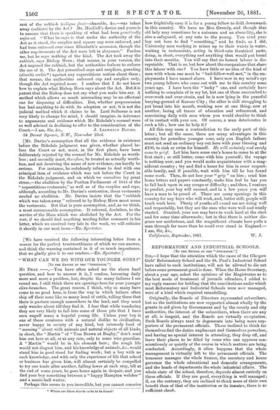REFORMATORY AND INDUSTRIAL SCHOOLS.
[To THE EDITOR OF THE " SPECTATOR."]
SIR, I hope that the attention which the cases of the Glasgow Girls' Reformatory School and the St. Paul's Industrial School have called to such institutions, will not be allowed to die out before some permanent good is done. When the Home Secretary, about a year ago, asked the opinions of the Magistrates as to the best mode of treatment of juvenile offenders, I added to my reply reasons for holding that the constitutions under which most Reformatory and Industrial Schools were now managed, were of a kind which required remodelling.
Originally, the Boards of Directors represented subscribers, but as the institutions are now supported almost wholly by the grants in aid given by Government and by the county and city authorities, the interest of the subscribers, when there are any at all, is languid, and the Boards are virtually co-optative. Such Boards always tend to degenerate into being mere sup- porters of the permanent officials. Those inclined to think for themselves find the duties unpleasant and themselves powerless, and having no special interest in attending, they drop off, and leave their places to be filled by some who can approve con- scientiously or quietly of the course in which matters are being conducted. Accordingly, it often happens that the whole management is virtually left to the permanent officials. The treasurer manages the whole finance, the secretary and house governor the whole educational and domestic arrangements, and the heads of departments the whole industrial affairs. The whole state of the school, therefore, depends almost entirely on these officials. If they are good, everything is well managed ; if, on the contrary, they are inclined to think more of their own benefit than of that of the institution or its inmates, there is no sufficient check.
Further Government inspection is undoubtedly required, but the time has come for the public making up its mind as to the fature of these institutions. It is wrong in principle, and must continually break dawn in practice, to leave large grants of money to be administered, and responsible duties to be per- formed, by directors who have not necessarily any qualification except that of having confidence in the qualifications of each other. This hap-hazard style of management must come to an end. If the Reformatory and Industrial Schools are to form part of the State machinery for preventing crime, let them, like the prisoners and penal settlements, go entirely under the Home Office. If, as I would prefer, they are to be considered as educational institutions, let them be managed as other public educational institutions are, and go either entirely under the management of the Central Government or entirely under the local School Boards, or under the joint management of both, according to the way in which the country shall think best to provide the funds. In any case, let the power which provides the funds have the responsible control.—I am, Sir, &c.,



































 Previous page
Previous page